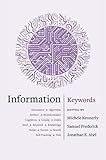Information : Keywords / ed. by Michele Kennerly, Samuel Frederick, Jonathan E. Abel.
Material type: TextPublisher: New York, NY : Columbia University Press, [2021]Copyright date: ©2021Description: 1 online resourceContent type:
TextPublisher: New York, NY : Columbia University Press, [2021]Copyright date: ©2021Description: 1 online resourceContent type: - 9780231198769
- 9780231552806
- 020 23
- online - DeGruyter
| Item type | Current library | Call number | URL | Status | Notes | Barcode | |
|---|---|---|---|---|---|---|---|
 eBook
eBook
|
Biblioteca "Angelicum" Pont. Univ. S.Tommaso d'Aquino Nuvola online | online - DeGruyter (Browse shelf(Opens below)) | Online access | Not for loan (Accesso limitato) | Accesso per gli utenti autorizzati / Access for authorized users | (dgr)9780231552806 |
Frontmatter -- CONTENTS -- Acknowledgments -- Introduction: Information + Humanities -- Abundance -- Algorithm -- Archive -- Bioinformatics -- Cognition -- Gossip -- Index -- Intel -- Keyword -- Knowledge -- Noise -- Screen -- Search -- Self- Tracking -- Tele (Τῆλε) -- Contributors -- Index
restricted access online access with authorization star
http://purl.org/coar/access_right/c_16ec
For decades, we have been told we live in the “information age”—a time when disruptive technological advancement has reshaped the categories and social uses of knowledge and when quantitative assessment is increasingly privileged. Such methodologies and concepts of information are usually considered the provenance of the natural and social sciences, which present them as politically and philosophically neutral. Yet the humanities should and do play an important role in interpreting and critiquing the historical, cultural, and conceptual nature of information.This book is one of two companion volumes that explore theories and histories of information from a humanistic perspective. They consider information as a long-standing feature of social, cultural, and conceptual management, a matter of social practice, and a fundamental challenge for the humanities today. Bringing together essays by prominent critics, Information: Keywords highlights the humanistic nature of information practices and concepts by thinking through key terms. It describes and anticipates directions for how the humanities can contribute to our understanding of information from a range of theoretical, historical, and global perspectives. Together with Information: A Reader, it sets forth a major humanistic vision of the concept of information.
Mode of access: Internet via World Wide Web.
In English.
Description based on online resource; title from PDF title page (publisher's Web site, viewed 25. Jun 2024)


